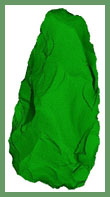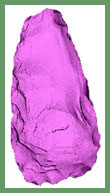|
■Nita, T., Konno, K., Chiba, F., Tokuyama, Y.,
A Method to Generate a Solid Model from Front and
Back Surface Models of a Stone Tool,
The Journal of JSAI, Vol. 11, No.1, pp. 1-8, (2005).
Abstract:
Digital data is widely used in the field of archeology;
especially, buried cultural assets are digitalized with a lot of methods.
In a method of generating a three dimensional model,
a stone tool is measured by a range scanning apparatus first,
so that three dimensional point clouds are provided.
After that, surface models are generated from the point clouds.
In that event, front and back surfaces of the tool are generated independently
because it is very difficult to measure front
and back surfaces of a stone tool simultaneously.
If, however, the surfaces are generated independently,
the applications of the generated surface models are limited.
If a solid model of a stone tool can be generated in a computer,
it is possible to analyze the stone tool about corruption of a digitalized stone tool,
or virtual visualization of the tool on computer display.
For another example, the replica of a stone tool can be easily generated
from the solid model.
Because of this reason, it is necessary to represent a stone tool with solid model,
so that the generated a digital data will be applied for various purposes.
In this paper, we propose a method to generate a solid model from the front and back surfaces
provided by measured data.
The method consists of appropriate registration of two surface models
and gluing two surfaces.
We have already calculated cross sections of the solid model
generated by our method and we have confirmed the effectiveness of the solid model.
|







